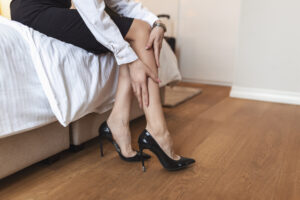8 Common Varicose Vein Myths
 Varicose veins are fairly common, yet they’re also widely misunderstood. In fact, there are many varicose vein myths that many people believe. Here, we discuss varicose veins treatments and other facts, while clearing up confusion and debunking eight common myths about this condition.
Varicose veins are fairly common, yet they’re also widely misunderstood. In fact, there are many varicose vein myths that many people believe. Here, we discuss varicose veins treatments and other facts, while clearing up confusion and debunking eight common myths about this condition.
- Myth: Varicose veins are purely a cosmetic problem. While it’s true that spider veins, a smaller version of varicose veins, are cosmetic, varicose veins can negatively impact your health. If you have varicose veins, you may experience pain, throbbing, burning, aching, restless legs, and you may be at higher risk of blood clots. If you seek professional help to treat varicose veins, the treatment will do more than just improve the physical appearance. It will alleviate uncomfortable symptoms as well.
- Myth: Varicose veins only affect older women. The truth is, while varicose veins disproportionately affect women, and they are more likely as you age, they can happen to anyone, of any gender, at any time. people in their 20s and 30s can get varicose veins for many different reasons, including a sedentary lifestyle.
- Myth: There’s no reliable treatment for varicose veins. When it comes to treatment, varicose veins are one condition with a wide variety of options. Cutting edge technology has made varicose veins highly treatable.
- Myth: If you have varicose veins, you’ll need surgery. Many varicose vein treatments are minimally invasive, requiring very little downtime. Unlike the invasive vein stripping surgery that used to be the primary treatment for varicose veins, today’s procedures are done quickly and cause very little to no lingering discomfort.
- Myth: Something you’ve done caused your varicose veins. You may have heard that pregnancy, crossing your legs, standing on hard surfaces, or wearing tight shoes or pants are all causes of varicose veins. In truth, while these things can exacerbate the problem, varicose veins are the result of weak or faulty valves within your veins. Inactivity can increase the pressure within your veins, though, so it’s advisable to take short walks throughout the day if you have a lifestyle that involves long stretches of sitting or standing.
- Myth: Varicose veins cannot be prevented. Sometimes, there’s nothing you can do to prevent varicose veins, because this condition can be hereditary. However, a healthy lifestyle, with a nutritious diet, regular exercise, and no tobacco use will decrease your chances of developing varicose veins.
- Myth: Varicose veins inevitably come back. There are certainly cases in which new varicose veins form after surgery. However, today’s minimally invasive techniques can lower your risk of varicose vein recurrence.
- Myth: Your insurance won’t cover your varicose vein treatment. In the past, this might have been true. Today, however, because there’s ample documentation of the physical and visual symptoms of varicose veins, most insurance companies will cover varicose veins treatment. However, some insurance companies do require patients to try remedies like compression socks or massage before undergoing a clinical procedure.
If you’re seeking varicose veins treatment or help with other vein issues, trust the board-certified physicians at the Arizona Vein & Laser Institute. Using the most advanced technology, the vascular and cardiovascular surgeons at the Arizona Vein & Laser Institute provide care for all types of venous diseases. With over 40 years of experience, our team of experienced physicians can devise the right treatment plan to address your venous disease problems. For more information contact us through our website.
